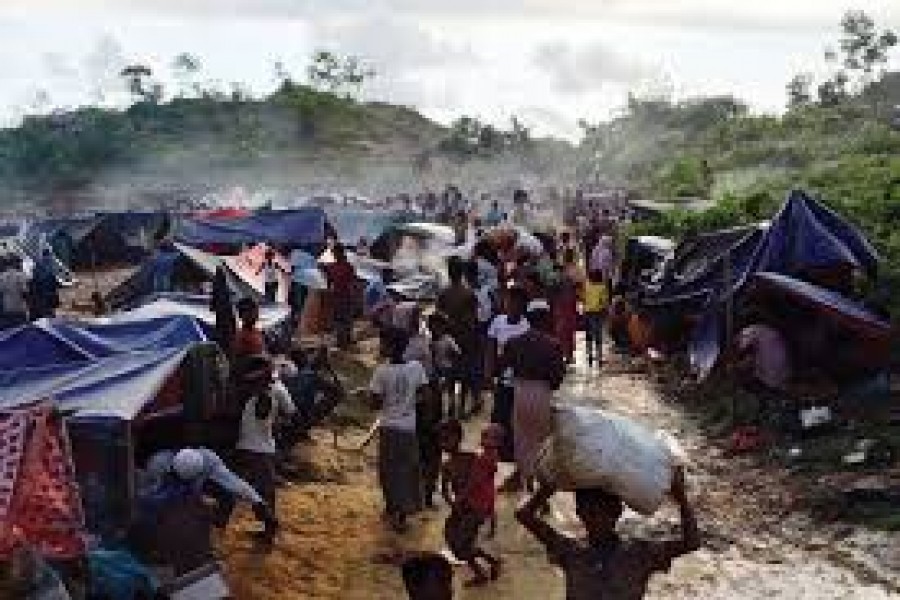Siyam Hoque
Published:2020-05-04 23:27:08 BdST
Poor funding worries humanitarian agencies supporting Rohingya
NEWS DESK
Less than 20 per cent of the 2020 Joint Response Plan for the Rohingya Humanitarian Crisis has been funded so far, said the Inter Sector Coordination Group (ISCG), the platform of international organisations providing humanitarian support to the Rohingya in Cox’s Bazar.
In order to sustain vital preparedness and response efforts for the cyclone season, funding is crucial and urgently needed, particularly for shelter and emergency items and to increase the capacity of mobile response teams, the ISCG said in a statement on Monday.
The lack of adequate funding risks compromising essential services and the health and wellbeing of both the Rohingya and their Bangladeshi hosts.
The restoration of 3G and 4G internet coverage in the Rohingya settlements and broader operational area remains a key request of the UN and humanitarian partners, it said.
As rains and thunderstorms batter Cox’s Bazar as a prelude to the cyclone season, and the danger of the COVID-19 pandemic looms in the district, Inter Sector Coordination Group (ISCG) partners – national and international NGOs and UN agencies – in support of the government of Bangladesh, are assisting thousands in the host community and Rohingya refugee camps to prepare for possible extreme weather.
A cyclone coming on top of the Covid-19 outbreak would intensify the ongoing humanitarian crisis, particularly in the refugee camps, where almost 860,000 Rohingya refugees are living in temporary shelters, many in hazardous terrain, and in overcrowded conditions, with limited resources and a lack of options for emergency relocation.
Cyclone and monsoon preparedness remain a key priority.
In line with the Government’s Standing Orders on Disaster, the humanitarian community has put in place a 72-hour response plan for an extreme weather event, in cooperation with the deputy commissioner of Cox’s Bazar, local authorities in Ukhiya and Teknaf upazilas (sub-districts), the Bangladesh Armed Forces, and the Refugee, Relief and Repatriation Commissioner (RRRC).
The cyclone response plan has been in place since last year and builds on joint cyclone and monsoon mitigation efforts in the past few years.
The UN and partner agencies have strategically prepositioned sufficient stock of emergency items such as food, tarpaulins, ropes, floor mats, and water purification tablets in warehouses located in Cox’s Bazar, Ukhiya, and Teknaf and containers within the camps, to ensure rapid access to support the most affected in both the Rohingya and host communities.
In addition to stockpiling, humanitarian partners are also accelerating other preparedness activities, including the distribution of tie-down kits and sensitisation and awareness raising both in the camps and in nearby Bangladeshi communities.
Restrictions put in place to mitigate risks of a Covid-19 outbreak in the camps have led to the suspension of some key activities, including slope stabilisation work and improvements to drainage systems.
The RRRC has issued a directive to limit operations to critical activities only and reduce the “footprint” of humanitarian personnel in the camps, consistent with the government’s public health policies aimed at curbing the spread of Covid-19.
Now more than ever, volunteers will be at the forefront of preparedness and response efforts. “Covid-19 adds a layer of complexity when it comes to preparing and responding to natural disasters. We are reviewing the cyclone response plan in this light, to see how risks of the virus spreading to Rohingya and Bangladeshi communities can be mitigated, while still being able to save lives together when severe weather hits Cox’s Bazar district,” explains Nicole Epting, ISCG senior coordinator in Cox’s Bazar.
The humanitarian bodies also noted that internet access is essential to facilitate humanitarian operations, strengthen security for personnel in the field and ensure that critical information reaches the people who need it most, as we prepare for the imminent cyclone season and work to contain the spread of Covid-19.
Unauthorized use or reproduction of The Finance Today content for commercial purposes is strictly prohibited.


